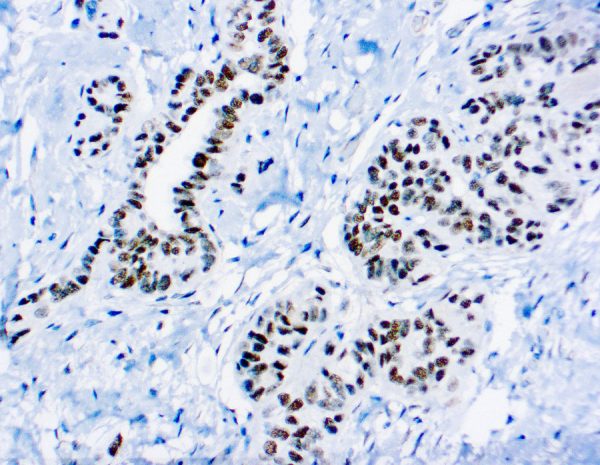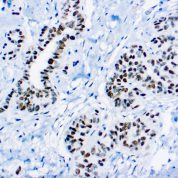Antibody (Suitable for clinical applications)
Sample Type: FFPE Patient Samples.
Tested Applications: IHC. Approved for In Vitro Diagnostic Procedures on FFPE tissues. For tissue collection recommendations, please see datasheet sent with product.
Application Notes
| Specification | Recommendation |
|---|---|
| Recommended Dilution (Conc) | 1:50-1:100 |
| Pretreatment | EDTA Buffer pH 8.0 |
| Incubation Parameters | 30 min at Room Temperature |
Prior to use, inspect vial for the presence of any precipitate or other unusual physical properties. These can indicate that the antibody has degraded and is no longer suitable for patient samples. Please run positive and negative controls simultaneously with all patient samples to account and control for errors in laboratory procedure. Use of methods or materials not recommended by enQuire Bio including change to dilution range and detection system should be routinely validated by the user.
Clonality: Monoclonal
Anti-Wilms Tumor 1 Protein Antibody Clone: 6F-H2
Host and Isotype: Mouse IgG1
Recommended Positive Control Sample: Wilms tumor
Cellular Localization of Antibody 6F-H2 Staining: Cytoplasmic, nuclear
Buffer and Stabilizer: PBS with 1% BSA and 0.05% NaN3
Antibody Concentration: Lot specific. Plese contact tech support for data.
Immunogen: BALB/C mice were injected with truncated human WT1 protein corresponding to N-terminal amino acids 1-181.
Storage Conditions: This antibody should be stored refrigerated (2-8°C). This product should not be used past the expiration date printed on the vial.
Wilms Tumor 1 Protein Information for Pathologists
Summary:
Tumor suppressor gene at 11p13. Protein is transcriptional regulator that apparently inhibits transcription of growth promoting genes. Involved in development of tissues from inner layer of intermediate mesoderm. Interpretation Nuclear stain.Common Uses By Pathologists:
Ovarian carcinoma (WT1+) vs. breast/pancreatic carcinoma (WT1 negative). Positive staining - normal Fallopian tube, kidney, mesothelium, ovarian granulosa cells, Sertoli cells, spleen. Positive staining - disease Acute myeloid leukemia, cystic partially differentiated nephroblastoma, desmoplastic small round cell tumor, malignant mesothelioma, metanephric adenoma, nephrogenic rests, ovarian carcinomas (serous carcinoma [almost all], transitional, small cell, Am J Surg Pathol 2005;29:1034), peritoneal serous carcinoma involving an endometrial polyp-80% (Am J Surg Pathol 2005;29:1074), rhabdoid tumor, Wilm tumor.Limitations and Warranty
This antibody is manufactured in accordance with clinical good manufacturing practices in an ISO13485:2016 certified production facility. It is intended for multiple uses including in vitro diagnostic use and research use only applications. Please see vial label for expiration date. We strive to always deliver antibodies with a shelf life of at least two years.






There are no reviews yet.